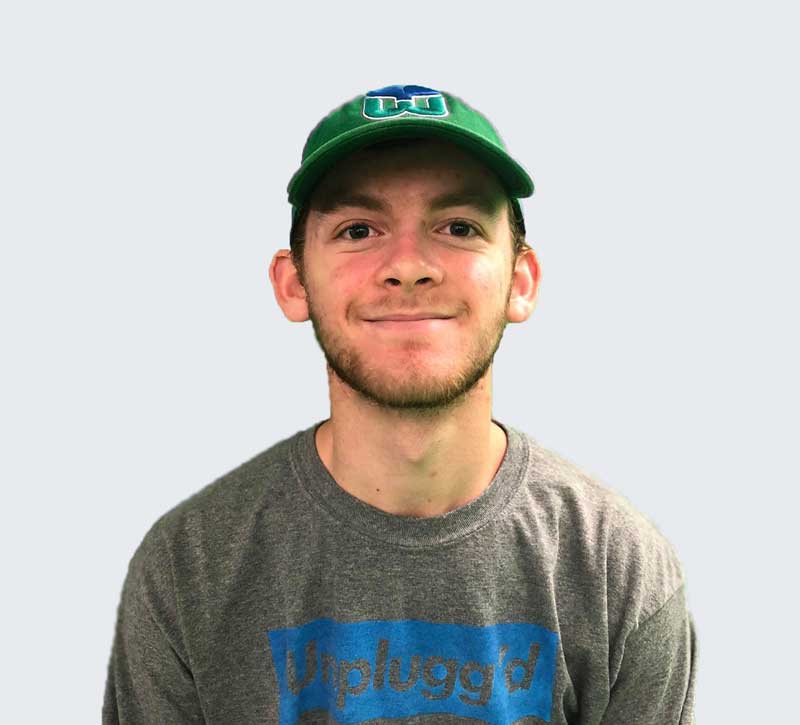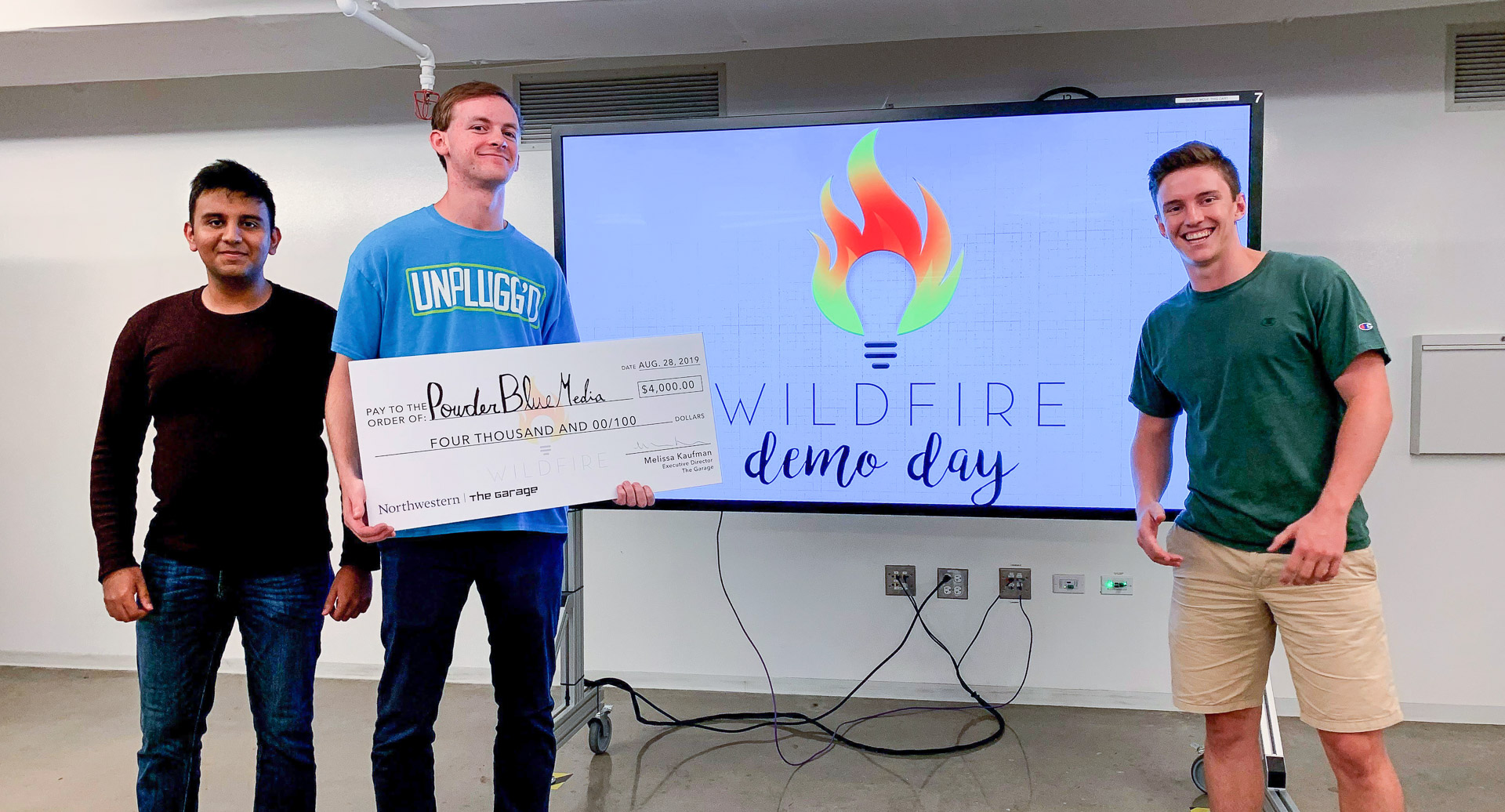Entrepreneur on Fire
How a 10KE grant winner took home the top prize at NU’s summer accelerator.
At AVG, we believe the world needs more creators and innovators, rather than lawyers or investment bankers.
It’s the reason we launched the 10,000 Entrepreneurs (10KE) program, which enables college students to pursue their entrepreneurial passions by giving them stipends for summer work at a fast-growing company or their own startup.
Nathan Graber-Lipperman (NU ‘21) is one such stand-out student entrepreneur. He was awarded a $2500 grant to support his work on his startup, Powder Blue Media, while he attended Wildfire, The Garage’s pre-accelerator program at Northwestern University. We recently sat down with Graber-Lipperman to learn more about his experience during the Wildfire program and how he’s using a digital platform to build real-life conversations.

How did you get your start as an entrepreneur?
I was a huge sneakerhead as a kid. Initially, I always hated when people resold sneakers, but once I got to middle school, I realized that if I wanted to be able to afford this expensive stuff, I might have to sell my soul to some degree. I ended up setting up a sneaker reselling business in seventh grade, right at the cusp of Internet sales. I was learning how to set up an online presence and working on eBay really early on. It was pretty ahead of the game for the time — even when I got to college, a lot of my friends didn’t know what PayPal was.
I credit my sneaker-selling experience with getting me into the sales aspect of running a business. There were times when I would go to the mall to deliver a pair of shoes to guys who were three times my age, and sometimes they wouldn’t even show up – I learned a lot just from that.
In high school, I really got into graphic design. I took a lot of classes, learned how to make T-shirts, and set up a screen-printing business that made $3000 or so over two years. Not a ton of money by any means, but it was cool to sell a physical product and get paid for something I really liked doing.
I learned a lot from that business, too, particularly how to deal with lots of revisions and fickle customers. Most high schoolers are cheap and unreliable! There were definitely times when I would have someone who said they were interested in buying a T-shirt for a dodgeball tournament or something like that, have a ton of changes during the design process, and then decide they didn’t want in the end.
Did those experiences inform your decision to pursue business in college?
Actually, taking all these experiences together, I wasn’t sure if I really wanted to college. I didn’t start my college search until the summer before my senior year. At that point, I just started Googling good business schools, and Northwestern popped up. I showed it to my mom and she pointed out that I was looking at one of the graduate schools.
My response? “What’s a graduate school?”
After that, I started looking into Northwestern more. I’d been writing online for SB Nation’s Chargers blog, Bolts From The Blue for a while (I’m a Chargers fan) and I had gotten some positive feedback from that, so the journalism program at Northwestern really appealed to me. It had a great reputation, and I thought the Integrated Marketing Communications track would be interesting.
So you were already creating content before you got into the Journalism program?
Absolutely. For my final high school English project, I created a website called “Unplugged with Nathan Graber-Lipperman.” It was a product of my time at SB Nation. If I wrote anything over 200 words, it wasn’t likely to get published. At the time, they were only interested in putting out as many pieces as possible, to drive clicks and views, and they would end up publishing so many errors. I wasn’t getting paid to write for them though, so I started Unplugged for my long-form sportswriting. I eventually started publishing content about pop culture too, similar to The Ringer. That was a platform I looked up to a lot.
Unplugged kept evolving from there. We eventually became Unplugg’d, and we launched our podcast network in January 2018. We had a lot of different people come on, like my friends and other interesting personalities that I’d met through Northwestern. We even had people reaching out to us directly – that’s how I met one of our current writers. He’s an English teacher in Ohio and messaged me to say he loved what we were doing. He gave us some examples of his writing and now he’s going to be one of our three paid writers starting in the fall.
Having paid staff is a big development! Walk me through how Unplugged evolved into Powder Blue Media.
Starting in December of this past year, we started to move on from just creating quality content, and into truly building a company. We started out with the mindset of “build it and they will come,” but we wanted to make sure we turned this into a real venture, something we could work on after school. We ended up forming Powder Blue Media, LLC, and had all these grand visions of four different departments.
In the beginning, we were a little apprehensive – we weren’t sure we were going to be able to make any money off it. We also considered making it into a subscription service. Even though a lot of things in media have trended towards subscriptions, but it’s still a largely unproven venture. But we wanted to try anyway. We got a Patreon account and started bringing in about $120 a month.
We still had all these different ideas about what we could do, including podcast as a service, but for the Wildfire program, we wanted to focus on coming out with a solid business plan. We got really lucky – we were paired with the Parkinson brothers for the summer, who are the founders of Peapod. Initially, Hayes Ferguson, who was running Wildfire, told us they were short handed as far as mentors, but they still had a couple of guys left who know nothing about media, but are pretty successful.
I thought that sounded great because I like working with someone with a different perspective. The Parkinsons have been phenomenal and came up with all these kooky, crazy ideas because they’ve been making products since they basically got out of the womb. They also paired us with their PR guy, Pierce Hollingsworth, who is a former Medill professor.
How did you narrow down your mission?
One Friday, about three weeks before the final pitch, we had a sitdown meeting with all of our mentors where we really explored what our brand means to us. In the past, it was just about quality content, but it’s hard to get people to come back when you’re a small brand that no one knows or cares about. Talking through our ideas more helped us come to the realization that, for us, it was all about going beyond mainstream narratives and having real, in-person conversations. You see a lot of destructive conversations and unhealthy dialog on social media nowadays. We realized that digital places that aren’t necessarily conducive to real conversation. Even though our delivery was still going to be digital, we wanted to facilitate having these discussions in the real world, at in-person events.
That meeting helped us stop thinking of Unplugg’d as just a media website, and more as a lifestyle brand that’s promoting authentic conversations through media, clothing, and events.
We’re still doing podcasts and content, but we’re paying a writing staff and looking at topics that are important to people our age – not just light topics like sports and pop culture, but things like the legalization of weed and how that’s going to affect business, or the trade war with China and how it may change our culture.
Aside from written content, what else is factoring into the new brand?
While we’re still based in media for the moment, we’re making merchandise a bigger part of it. We’re donating 10-15% to various mental health organizations because we think it’s important to our mission in terms of promoting a healthy digital and personal lifestyle for Gen Z. We’re working with designers and other people in the fashion industry to move that side of the business forward, since I don’t really consider myself very fashionable, even though I’ve made T-shirts in the past!
In terms of events, we’re planning to have a handful in the fall, plus a larger event in December. We want this larger one to be a convention-style event, with musical performances and panels. We’re moving into that space because we feel that it’s the future of media and where our values stand. This whole long term plan fits in with my ideals and what format we think the next generation needs to talk about complex issues.
What was your final pitch like?
Everything really came together with that pitch. Our plan this summer was to set up an actual business, and we figured we’d put the pitch together down the road. But the people we worked with in the program were actually freaking out because we didn’t have a pitch a week and a half before the end of the program! They didn’t think we’d have one in time for the final presentation. So I worked on it for fourteen hours straight in the three days leading up to the competition, I made the video and memorized the script for it. We were surprised, but we took home the first place prize!

What’s your next mission, now that Wildfire is over?
First thing to work on now that Wildfire is over is proving that our events can work. We want to prove we can fill up a room with 200 people. Moving forward, we want to see if the summit-style event will help people engage with what we’re doing. It was a pretty drastic pivot – we always said we wanted to do events, but it became a huge part of our plan by the end of the summer. In that regard, Fall 2019 will be geared toward that viability.
How did the 10KE grant factor into your work at Wildfire this summer?
I put the 10KE grant towards covering expenses, like my rent. We were very lucky in that my team had multiple sources of funding. Our award from the Wildfire program was a 10K grant, and we put that, plus a little more money that we had, towards paying our third member for the summer, and we have roughly 5K leftover that we’ll be investing back into the company. Our costs are pretty low, so our people are the most expensive part.
I knew I wanted to do this program since last summer, so getting money to be able to work on this project, made this the perfect summer for me. I loved being on campus out in Evanston. I was in there working til 9 pm grinding most days. If I’m going to be here, I’m going to be working. I loved getting to go to the Garage every day. I’d recommend it to anyone. The stipend is awesome, and having the award money at the end means we can invest even more in the company.